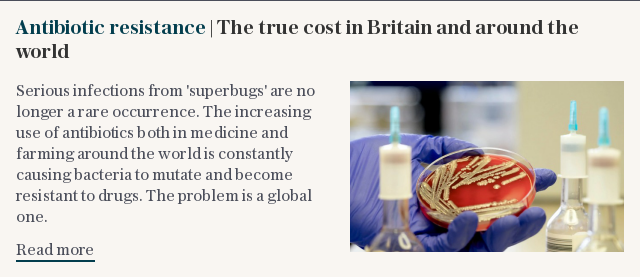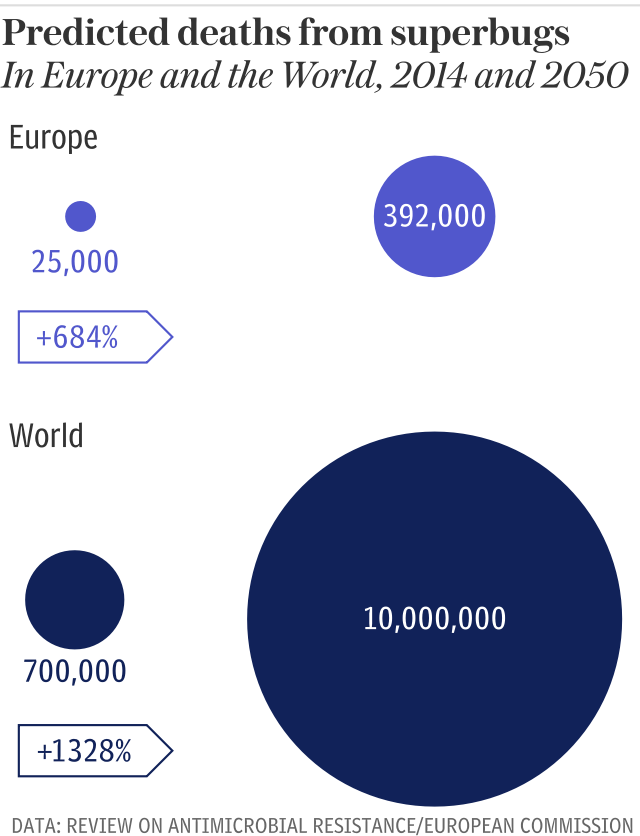World 'precariously reliant' on handful of companies developing drugs to treat superbugs, report warns

The world is “precariously reliant” on just a handful of companies to develop new antibiotics, running the risk of a rise in superbugs, a report has warned.
The Access to Medicine Foundation’s two-yearly Antibiotic Resistance Benchmark report, which looks at pharmaceutical companies’ efforts to tackle antimicrobial resistance, has found that only a core group of eight major drug firms are developing antibiotics and the pipeline of new products is very small.
The growing threat of drug resistance – predicted to kill 10 million people by 2050 if it continues at its current rate – means that, increasingly, the treatments we rely on to kill infections are not working and new ones are needed.
But because antibiotics are not viewed as a profitable product many companies are retreating from the market.
Multinational pharmaceutical companies Novartis and Sanofi have both withdrawn from developing antibiotics in the last 12 months while two smaller biotechs, Achaogen and Melinta, have filed for bankruptcy.

The collapse of Achaogen was particularly galling because its new antibiotic had been approved by the United States Food and Drug Administration.
The AMR Benchmark report echoes a warning from the World Health Organization last week that a lack of private investment and innovation in the development of new antibiotics is undermining efforts to combat drug-resistant infections.
The WHO report said the 50 antibiotics in development bring little benefit over existing treatments and very few target the most resistant bacteria.
WHO added those products in the early stages of clinical development were more innovative but would take many years to come to market.
The benchmark report looked at individual pharmaceutical companies and found that out of the larger companies GSK has the biggest pipeline and is developing the bulk of new vaccines. Johnson & Johnson performed strongly for the second year, largely for its actions to improve access to treatment for tuberculosis.
Pfizer has also become the first company to share data on the spread of antibiotic resistance.
However, the report also warned that companies are slow to make antibiotics available to low and middle income countries.

Just three of the 13 antibiotics analysed in the report are registered in countries that need better access to antibiotics.
And when it comes to older – but still useful – antibiotics companies are supplying just 14 of 30 so-called “forgotten” antibiotics to low-income countries, the report found.
Jayasree Iyer, executive director of the foundation, said there were some promising policies coming from both governments and companies to limit the use of antibiotics - overuse and misuse of the drugs are a key driver of resistance.
She praised the UK government for seeking a new payment model for antibiotics – companies will be paid for the usefulness of their product rather than by volume. And some companies, such as Pfizer, are ending the practice of linking sales agents bonuses to the number of antibiotics they sell.
But Ms Iyer added: “One thing people have to realise is that AMR is not just a political statement you can sign up to. It’s a real threat to people – not only in low and middle income countries but to people who are immuno-compromised.
“People have to realise that drug-resistant infections are right there in front of us,” she said.

Tim Jinks, head of drug-resistant infections priority programme at Wellcome, said drug-resistant infections were one of the greatest global public health threats of our time.
“It is also very disappointing to see such little progress in closing the access gap for antibiotics. Multinational companies have the best capabilities to use their global reach to pave the way for multi-country registration, which would have a huge impact on access," he said.
Phil Thomson, president of global affairs at GSK, said the company had 27 projects targeting priority pathogens and was also working on vaccines.
He added: “It is good that the benchmark recognises our contribution, but as the report makes clear, more must be done and engagement and action from governments and other relevant stakeholders, as well as the private sector, is key.”
Protect yourself and your family by learning more about Global Health Security. And sign up to our weekly newsletter here.

